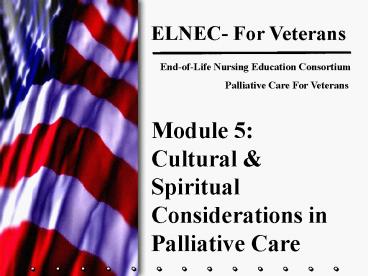Cultural Considerations in Palliative Care - PowerPoint PPT Presentation
1 / 24
Title:
Cultural Considerations in Palliative Care
Description:
Module 5: Cultural & Spiritual Considerations in Palliative Care * * * Gulf War: Gulf War Sickness -Multi-symptom based medical/psychiatric conditions reported ... – PowerPoint PPT presentation
Number of Views:450
Avg rating:3.0/5.0
Title: Cultural Considerations in Palliative Care
1
Module 5Cultural Spiritual Considerations in
Palliative Care
2
Culture Defined
- System of shared symbols
- Provides security, integrity, belonging
- Constantly evolving
- Making meaning of illness
- Not limited to race or ethnicity
3
Cultural Demographics of Veterans
- 23.8 M living Veterans
- 7.5 are women
- 14 of deployed US forces are women
- Largest group from Vietnam (7.9M)
- 60 live in urban areas
- White male (primary gender and race)
- Older Veterans
- Reinberg, 2010, US Veterans Advisory Council,
2009a
4
Cultural Competence
Campinha-Bacote, 2003
5
Components Within Culture
- Ethnicity
- Race
- Gender
- Age
- Religion and spirituality
- Sexual orientation
6
Components Within Culture (cont.)
- Differing abilities
- Financial status
- Place of residency
- Employment
- Education level
- Cause of death
7
Race/Ethnicity Among Veterans Female/Male
Origin Race
Race/Ethnicity Female Male
White, Non Hispanics 69 81
Hispanics 6 7
African Americans 19 10
Asians 2 1
Native Americans 1 1
Pacific Islanders lt1 lt1
8
Cultural Demographics Women in the Military
- Estimated 1.8 M in service in 2010
- 40 have at least a bachelors degree
- 61.5 from post-Vietnam era
- 240,000 sought care at VA facilities (2006)
- Top 3 diagnoses
- PTSD
- Hypertension
- Depression
- VA, 2007
9
Cultural Demographics Different Wars
- World War II
- Enthusiastically supported by Americans
- Mission enhanced unity
- Korean Conflict
- Never officially declared a war
- Forgotten war
- Cold War
- Atomic Veterans
- Grassman, 2009 VA Advisory Council/NHPCO, 2009a
10
Cultural Demographics Different Wars (cont.)
- Vietnam War
- Soldiers shamed and dishonored
- Frequently rotated new troops
- Agent Orange
11
Cultural Demographics Different Wars (cont)
- Gulf War
- Greeted home as heroes
- Concerns about toxic agents
- ALS
- Operation Enduring Freedom (OEF)/Operation Iraqi
Freedom (OIF) - Over 1.7 million deployed
- Long and multiple deployments
- Horner et al., 2003
12
Cultural DemographicsPoor and Homeless Veterans
- 23 of homeless are Veterans
- 47 served in Vietnam
- 33 served in war zone
- 89 had honorable discharge
- 45 are mentally ill
- 70 have substance abuse problems
National Coalition for Homeless Veterans, 2009
VA Advisory Council , 2009b
13
Providing Care to the Terminally Ill, Poor and
Homeless
- Expect trust to be earned over time
- Respect the persons humanity
- Appreciate their unique story
- Recognize/address maladaptive behaviors
- Hughes, 2010
14
Cultural DemographicsVeterans and Substance
Abuse
- Affects 500,000 Veterans who access VA
healthcare systems annually - Alcohol
- Marijuana
- Combat exposure
- Department of VA, Department of Defense, 2009
15
Cultural DemographicsVeterans Incarcerated
- 225,000 Veterans have been incarcerated (1998)
- 20 saw combat
- 60 served in the Army
- 35 convicted of homicide or sexual assault
- National Coalition for Homeless Veterans, 2009
16
Components of Cultural Assessment
- Veteran, family, community
- Birthplace
- Ethnic identity
- Community
- Decision making
- Language and
- communication
17
Components of Cultural Assessment (cont.)
- Religion
- Food preferences, prohibitions
- Economic situation
- Health beliefs regarding
- Death
- Grief
- Pain
- Non-traditional therapies
- Care of the body
- Organ donation
18
Nurses Self Assessment of Culture
- Self assessment
- Cultural beliefs of co-workers
19
Cultural Considerations of Communication
- Conversation styles
- Personal space
- Eye contact
- Touch
- View of healthcare professionals
- Learning styles
- Language/gestures
20
Role of the Family
- Who makes the decision?
- Who is included in discussions?
- Is full disclosure acceptable?
21
Cultural Influences on Decision Making
- Beliefs about autonomy and other values differ
- Disclosure of diagnosis and prognosis
- Ascertain desire for disclosure
22
Language Used at the End of Life
- Discontinuation
- DNR
- Withdrawing/withholding
- Organ donation
23
When Cultures Clash
- Clashes occur
- Assess your reactions
- Never lie
- Offer information
- Use cultural guides
24
Conclusion
- Culture is a major influence on end-of-life care
- Self assessment of culture
- Many dimensions of culture
- Culturally sensitive care
- Interdisciplinary care































